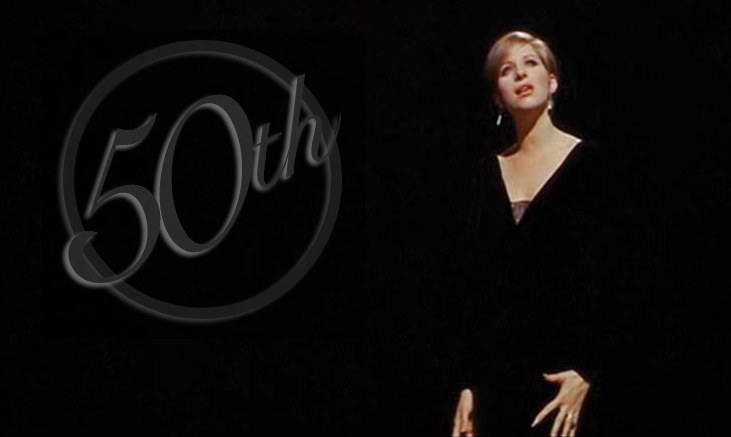by Tim

This past week bore witness to one of the most very important anniversaries imaginable: Funny Girl turned fifty. And if you don't know what Funny Girl is and why it matters, I'm a little shocked you found this site, but I'm happy to explain that it's a Best Picture-nominated musical directed by Oscar favorite William Wyler, and the film debut of cabaret singer-turned-Broadway star-turned embodied deity Barbra Streisand. Who also got some Oscar love, winning Best Actress in a tie with Katharine Hepburn's turn in The Lion in Winter.
Not least among the achievements of Funny Girl is that, when thus compared head-to-head with one of the grandest dames of screen acting, Streisand looks like pretty worth recipient of that honor. Funny Girl, as scripted by Isobel Lennart (who also wrote the book for the 1963 stage version, also starring Streisand), is a gift to its lead, offering pretty much everything you could want to demand of a musical theater actor: broad comedy! tear-jerking heartbreak! steel-willed fortitude! songs where you have to be manic! songs where you have to be pensive!
 It's a showcase role for the complete spectrum of talent possessed by whomever takes on the title role of iconic comedian Fanny Brice, and it's hard to see how any decently talented star couldn't make a strong impact with all the deck stacked in her favor. Streisand, for her part, was far more than "decently" talented, and what she ended up doing with Brice ranks among the very best debut performances on the books.
It's a showcase role for the complete spectrum of talent possessed by whomever takes on the title role of iconic comedian Fanny Brice, and it's hard to see how any decently talented star couldn't make a strong impact with all the deck stacked in her favor. Streisand, for her part, was far more than "decently" talented, and what she ended up doing with Brice ranks among the very best debut performances on the books.
The genius in the performance lies substantially in how she layers moods. Streisand's Fanny is never just an eager innocent, or just a suffering wronged woman, or just a hard-working comic. She constantly weaves emotions in and out: for example making Fanny's characteristic hard-charging prattle seem like a mask for nerves, or impatience, or anger, not just as a sign of the character's constant comic energy. But at the same time, she doesn't bury the fact that Fanny really, really likes to tell jokes. Half a century onward, the idea that comedians are hiding their real feelings under gags isn't remotely new, but in remembering that this can co-exist with insight and creativity into what's funny for an audience, and the reality that even for shy, self-loathing people, making humor is pleasurable in its own right, that's where Streisand's electrifying work shines. And you can substitute a similar line of reasoning for so many moments in the film: her soaring rendition of the great song "People", which is in her hands as much about trying to flirt with Omar Sharif's Nick and making sure he's the kind of man she wants to flirt with as it is about having a showstopping number; or, in maybe my favorite single moment of her performance, her inner conflict during dinner with Nick at being very curious about what it might be like to sleep with him while also being extremely, rightfully pissed at him for taking it for granted that she's thus curious.

There's very little question that Streisand is the best thing about Funny Girl, and the next half-century of her career has made it even harder to keep in mind that there's anything else happening in the film, but it is worth keeping in mind that Best Actress was just one of eight nominations the film received.
There is a movie behind the performance, that is to say, and a movie with a fair share of charm at that. Probably not "Best Picture nominee" levels of charm, but for all the obvious flaws (the hefty running time, a tendency toward over-bright cinematography that makes everything look a little fake, Sharif's inability to avoid being blown off the screen by his co-star), the strengths are enough to make this one of the strongest musicals of the late '60s. Especially compared to some of the other period piece musicals from right around the same time, like 1967's Doctor Dolittle, or 1969's Paint Your Wagon and Hello, Dolly! (the latter with Streisand as lost in the material as Funny Girl finds her in control of it), this film does excellent work in bring its old-fashioned setting alive with busy, detailed sets and costumes. And the film also benefits from a pretty great set of songs, admittedly rather modern-sounding, that Streisand belts out without holding anything back. It's also pretty damn funny, capturing something of the go-for-broke energy that made Brice one of the great stars of her generation.
No doubt that the film is showing its age pretty substantially after a half-century, as it well might, but it's still a lot fresher than most of the films it was in direct competition with. Of course Streisand's star-is-born performance remains all the justification one would need to see it anyway, but the film's qualities as a handsomely-mounted musical are enough to make this a worthwhile film to revisit.